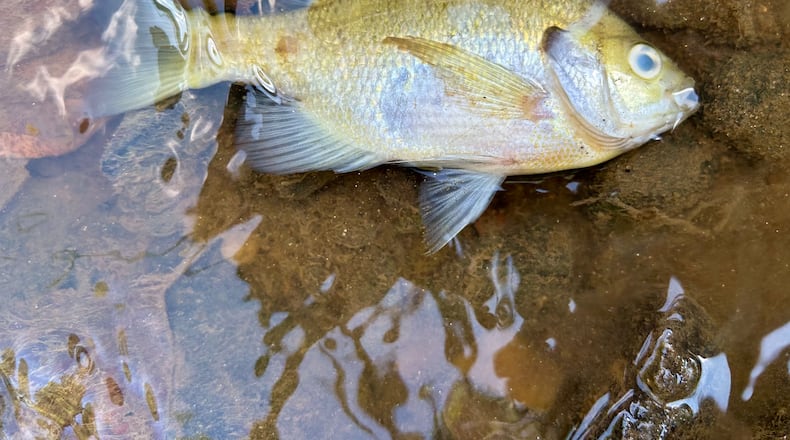Officials are investigating a pollution incident that occurred earlier this month a few miles south of downtown Atlanta, which local water advocates say sent toxins into a tributary of the South River and killed fish for miles downstream.
The pollution was discovered Sept. 6 by a group of Georgia State University students conducting regularly scheduled water sampling, when they noticed black, smoky water flowing in the river as it crosses under Forrest Park Road in south Fulton County, said Sarah H. Ledford, a Georgia State professor of geosciences.
Therese Kelly
Therese Kelly
Lab analysis of the samples collected revealed E. coli concentrations thousands of times higher than the federal Clean Water Act allows, Ledford said. Data from U.S. Geological Survey water gauges stationed in the same part of the river and farther downstream show dissolved oxygen values plummeted to around 2 milligrams per liter from Sept. 6-7. Oxygen concentrations that low are known to trigger fish kills.
On Monday, Ledford said her students returned to sites along the river and found dead fish in numbers of 50 or more at multiple locations, including as far south as Bouldercrest Road, roughly 4 miles downstream from where the pollution was first spotted.
Exactly who is blame for the incident is unclear, but Mayor Andre Dickens’ press secretary, Michael Smith, said a fire that engulfed a mulch pile was the source of the pollution.
Videos from Sept. 5 shared with The Atlanta Journal-Constitution show firetrucks spraying water on piles of wood near the intersection of Jonesboro Road and Harper Road, near a tributary of the South River.
Ledford said her “best guess” was that the mulch pile was treated with fertilizer or sewage sludge, and that runoff from firefighters’ attempts to extinguish it led to the fish kills.
Such a scenario would unleash “organic matter,” she said, that would provide a feast for hungry microbes in the stream and could cause dissolved oxygen levels to drop.
The Georgia Environmental Protection Division confirmed it is investigating the matter and working to restore the stream buffer and clean up tree debris at the site, but provided few other details.
Smith said the city’s Department of Watershed Management is collaborating with partners to address the pollution and has installed two rows of silt fencing to protect the nearby stream. He added that Atlanta City Councilmember Jason Winston, who represents the area where the event occurred, has visited the site and that the city would consider citations for those responsible, if warranted.
“The city is highly committed to ensuring the safety and integrity of the state waters in Georgia that traverse through the city of Atlanta,” he added.
The South River is no stranger to pollution.
From its headwaters near Atlanta, the river winds its way southeast through some of the metro area’s mostly heavily industrialized corridors and has dealt with pollution problems for decades.
In 2021, the South River was named one of the country’s most endangered waterways by the environmental group American Rivers.
Therese Kelly
Therese Kelly
Jacqueline Echols, the president of the South River Watershed Alliance’s board, said the incident was just the latest example of the waterway’s long-running neglect by environmental regulators.
“This area of southeast Atlanta near the South River attracts businesses that degrade the environment and the city’s code enforcement in the area is lax … ,” Echols said.
Ledford said her students were collecting more water samples on Thursday, but said she worries heavy rains expected to fall in Atlanta this weekend could send more pollutants into the river. Metro Atlanta could receive up to 3 inches of rain through Sunday, according to the National Hurricane Center.
“Our major concern is another huge plume of organic matter is going to enter the stream and cause another dissolved oxygen crash,” she said.
About the Author







